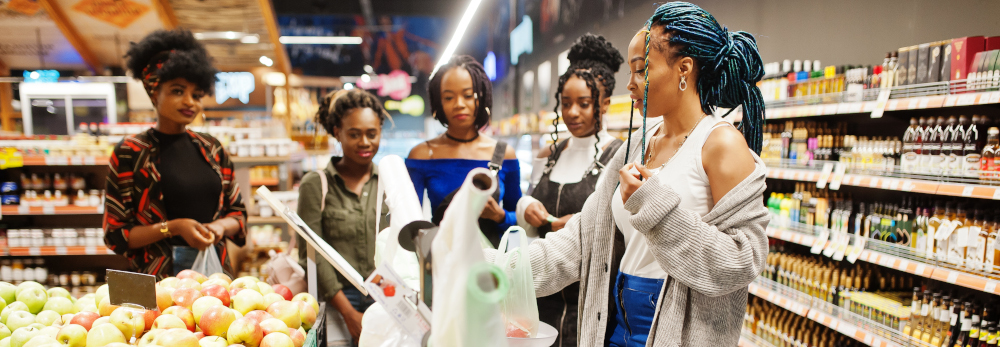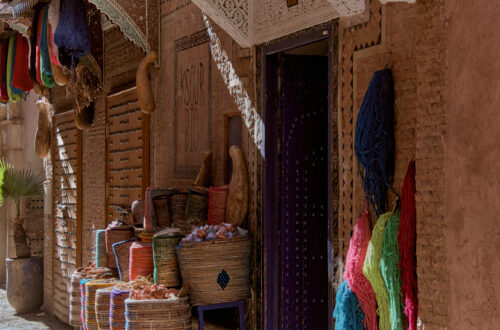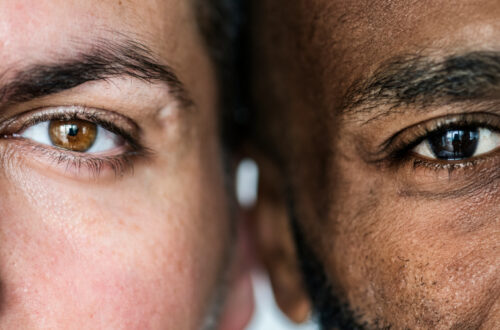
The Bread You Don’t Buy, Cashier Lines, Eye Contact, and the Art of Pretending It’s Fine
There’s a science to standing in a supermarket when you don’t intend to buy. You enter with purpose, not because you have any, but because walking slowly or looking hesitant invites the wrong kind of attention, from staff, from security, from other people who, like you, are here for reasons that stretch far beyond groceries. You walk in with a list that exists only in your mind. A mental loop of items you once bought easily, items you’ll pretend to compare now, letting your fingers skim barcodes and your eyes rest on price tags like someone choosing, when really, you already know how the story ends.
Shoprite is full by midday. It’s always full. Grandmothers with rigid handbags. Children licking their thumbs, tired from school. Men in uniforms from nearby warehouses. Women pushing trolleys like shields. Everyone moving with rhythm. Everyone pretending they don’t see each other. There are two kinds of silence here, the one from being focused, and the one from not wanting anyone to know you’re counting change in your pocket with your fingertips.
The bread aisle is a particular theatre. White loaves stacked with military precision, blue-tag specials that flash with casual cruelty. You walk past the shelves and your eyes land on the brown bread, then the cheaper store-brand next to it, the one with packaging that always crumples at the ends like it already knows its place. You pick one up, not because you’re going to buy it, but because holding something makes you feel like a customer. Holding something means no one will ask if you need help. It lets you breathe.
There’s a kid near you. Probably no older than 12, in school shoes that don’t match his socks. He’s holding a packet of vetkoek dough and a tin of pilchards. You watch him calculate. He holds the tin longer than he needs to, checking weight, pretending he’s making a choice. But you both know he’s doing the maths. He puts the tin back and holds the dough like it’s all he came for. His body straightens. A decision made. You nod as he walks off, not to him but to the space he left behind.
At the till, you queue with nothing in your hands. Just standing there, two people behind someone whose basket overflows. You do this sometimes. Stand in queues so it doesn’t look like you were just walking around. It gives your visit structure. It makes it less sad. You smile when the cashier greets you, give the small talk energy you’ve saved up. Then you step out of line. Pretend to get a cold drink. Pretend you forgot something. Sometimes, you even leave with a pack of gum or a single onion, your exit ticket, your proof that you weren’t just loitering.
 Outside, the sunlight feels too sharp. You find a spot near the bus stop or the taxi rank and sit on the low wall. You open your phone, scroll nothing. Everyone does this. Posture of the digitally occupied. You’re not waiting. You’re not broke. You’re just in between things. Your last R50 went on school fees. Or transport. Or electricity. Or that funeral. Or just vanished into the way life eats small money before it even has the chance to pile.
Outside, the sunlight feels too sharp. You find a spot near the bus stop or the taxi rank and sit on the low wall. You open your phone, scroll nothing. Everyone does this. Posture of the digitally occupied. You’re not waiting. You’re not broke. You’re just in between things. Your last R50 went on school fees. Or transport. Or electricity. Or that funeral. Or just vanished into the way life eats small money before it even has the chance to pile.
Back inside, people are still shopping like nothing broke. You wonder what it’s like to fill a trolley and not watch the total climb. You wonder if they do the same sums you do, how many days this can stretch, how much is left in the envelope, how close to zero they are allowed to live. You wonder if they’ve ever stood by the freezers just to cool off and look busy, or ducked into the cleaning aisle when someone they know walks in.
The bread you don’t buy doesn’t haunt you. It just lives with you. You remember the feel of it. The way the plastic twists at the end. You’ve eaten enough of it to know its weight in your hand. Sometimes, when you do have the cash, you pick the same loaf you used to hold and put back. It feels like a small win. Like claiming a part of yourself back. And sometimes you buy the fancier one, not because you like it more, but because it reminds you that you can. That this week, you could choose.
No one teaches you how to live like this. You just learn. You adapt. You master the art of pretending it’s fine. Of walking into places where you used to be a customer and becoming a ghost. Not a criminal. Not a beggar. Just someone passing through, invisible but present. Someone who still wants to feel part of the city’s rhythm. Who still wants to see colour, movement, light. Who still wants to remember the smell of fresh bread, even if your fingers don’t leave with it.
The days stack, like loaves on that shelf. Some soft. Some stale. You move through them, one foot in front of the other, pretending you’re just looking. You are. Just looking. For work. For meaning. For a way out. For a reason to pick up the bread and walk to the till without shame, without fear, without counting.
And when that day comes, and it does, even if slowly, you’ll buy two. One to eat. One to remember. Because hunger isn’t always in the stomach. Sometimes it’s in the silence of being seen but not acknowledged. And sometimes, the most sacred kind of dignity is just walking into a Shoprite, picking up bread, and not needing to pretend.




